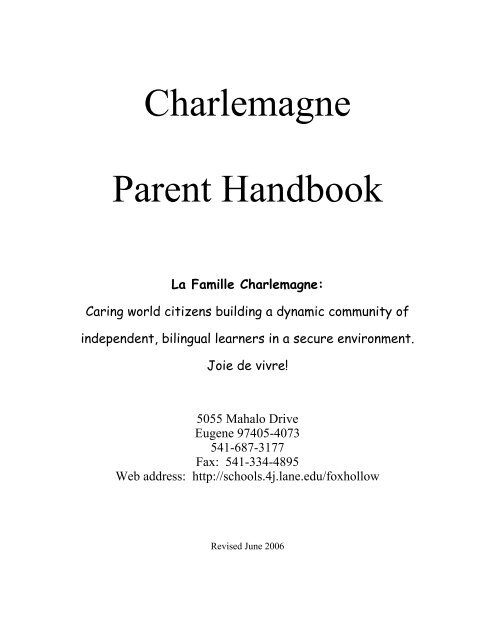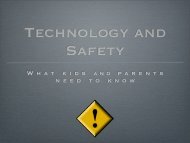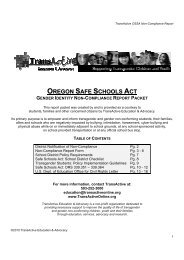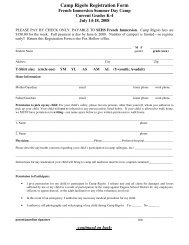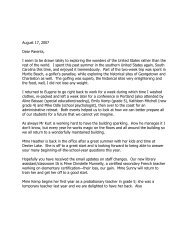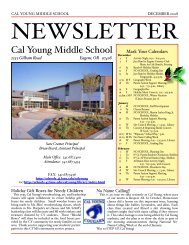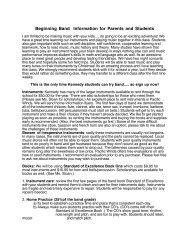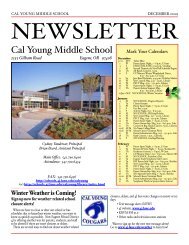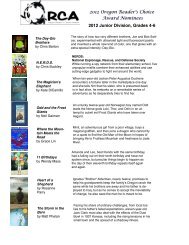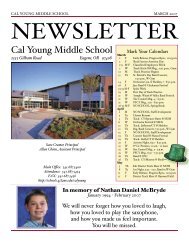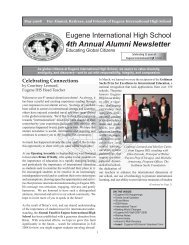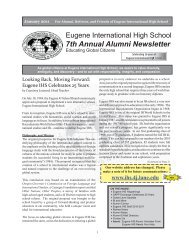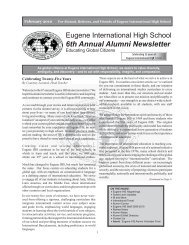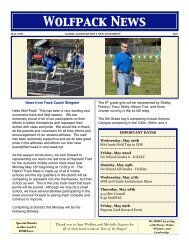Charlemagne Parent Handbook - 4J School District
Charlemagne Parent Handbook - 4J School District
Charlemagne Parent Handbook - 4J School District
You also want an ePaper? Increase the reach of your titles
YUMPU automatically turns print PDFs into web optimized ePapers that Google loves.
<strong>Charlemagne</strong><br />
<strong>Parent</strong> <strong>Handbook</strong><br />
La Famille <strong>Charlemagne</strong>:<br />
Caring world citizens building a dynamic community of<br />
independent, bilingual learners in a secure environment.<br />
Joie de vivre!<br />
5055 Mahalo Drive<br />
Eugene 97405-4073<br />
541-687-3177<br />
Fax: 541-334-4895<br />
Web address: http://schools.4j.lane.edu/foxhollow<br />
Revised June 2006
Dear <strong>Parent</strong>s,<br />
This <strong>Parent</strong> <strong>Handbook</strong> was designed as a resource to help you understand the<br />
resources available at <strong>Charlemagne</strong> so that you can better access them in<br />
meeting the needs of your child. We hope that it is helpful.<br />
If you have suggestions for improving the handbook, please give them to any<br />
Site Council representative, or drop a note at the front office.<br />
Sincerely,<br />
<strong>Charlemagne</strong> Site Council<br />
1
TABLE OF CONTENTS<br />
The Basics page<br />
Welcome ....................................................................................................................................3<br />
Daily Schedule, Yearly Schedule ..............................................................................................3<br />
Inclement Weather/<strong>School</strong> Closure Days ..................................................................................3<br />
Who to Call.............................................................................................................................4,5<br />
Traffic, Carpooling, Attendance ................................................................................................6<br />
Truancy, Food and Food Service...............................................................................................7<br />
Field Trips and Special Events ..................................................................................................8<br />
Class Holiday Parties and Special Occasions............................................................................8<br />
Supplies and Belongings............................................................................................................9<br />
Illness, Injury and Emergency Care...........................................................................................9<br />
Curriculum, Support, Expectations<br />
Curriculum Highlights .............................................................................................................10<br />
<strong>School</strong> Improvement Goals, Student Goals, Vision ................................................................10<br />
Instructional Program ....................................................................................................... 11- 13<br />
Support Programs.....................................................................................................................13<br />
Additional Resources...............................................................................................................14<br />
Camp Rigolo<br />
Tutoring<br />
French for <strong>Parent</strong>s<br />
Québec Trip<br />
Classroom Placement<br />
Homework: Teacher, Student, <strong>Parent</strong> Responsibilities ..........................................................15<br />
<strong>School</strong> Discipline Procedures and Expectations of Behavior..................................................16<br />
Harassment, Discrimination,…Intimidation, Bullying, Retaliation ........................................17<br />
Behavioral Referrals ................................................................................................................17<br />
<strong>Parent</strong> Communication and Involvement Opportunities<br />
Newsletter ................................................................................................................................18<br />
Web Page .................................................................................................................................18<br />
Student Directory.....................................................................................................................18<br />
Weekly Letters.........................................................................................................................18<br />
Visiting Classrooms.................................................................................................................18<br />
Open House..............................................................................................................................19<br />
Curriculum Night.....................................................................................................................19<br />
<strong>Parent</strong>-Teacher Conferences ....................................................................................................19<br />
<strong>District</strong> Complaint Process ......................................................................................................19<br />
Volunteers................................................................................................................................20<br />
<strong>Parent</strong> Teacher Organization (PTO) ..................................................................................20, 21<br />
Site Council..............................................................................................................................23<br />
2
Welcome! Bienvenue!!<br />
Part of what makes <strong>Charlemagne</strong> at Fox Hollow such a rich educational environment is the time<br />
and energy that parents bring to our school. Our students come ready and eager to learn and<br />
parents support them at home and through volunteer opportunities throughout the school.<br />
Hopefully, this parent handbook will answer most questions you may have. If not, please be sure<br />
to contact the front office. Get to know our teachers and other parents. Drop in the office or call.<br />
Come to school events and meetings and bring your questions and ideas. There are many<br />
exciting ways to get involved.<br />
Daily Schedule<br />
Monday - Thursday<br />
8:20 Classrooms open.<br />
8:30 Morning instructional block begins. To avoid being tardy students must be<br />
in their seats and ready to begin working at 8:30.<br />
10:00 - 10:15 Morning recess for grades K, 1, 2, 3<br />
10:15 - 10:30 Morning recess for grades 4, 5<br />
11:00 - 11:40 Lunch for grades K, 2 followed by recess<br />
11:20 –12:00 Lunch for grades 1, 4 followed by recess<br />
11:20 – 12:00 Recess for grades 3, 5 followed by lunch<br />
12:00 – 2:45 Afternoon instructional block<br />
Afternoon recess for grades K, 1, 2, 3 as determined by teachers<br />
*2:45 - 3:00 The school day is done; supervised afternoon pick-up<br />
Friday only<br />
*(1:30 - 1:45) Afternoon pick-up<br />
Please note: There is NO staff supervision for students at <strong>Charlemagne</strong> before 8:15 or after 3:00.<br />
Childcare for students who need to arrive before 8:15 and for those not picked up by 3:00 is<br />
available through the YMCA Fun Club in the cafeteria. Please either enroll your student or<br />
purchase a drop-in card for the most economical use of this service. You may enroll in the<br />
YMCA Fun Club for before and after-school care by calling 686-9622.<br />
Kindergarten: <strong>Charlemagne</strong> at Fox Hollow offers two sessions of kindergarten:<br />
8:30 - 2:45 Monday and Wednesday, plus Friday morning from 8:30 - 10:30, or,<br />
8:30 - 2:45 Tuesday and Thursday, plus Friday afternoon from 11:30 - 1:30.<br />
There is no Friday lunch for kindergartners.<br />
Early Release Early release days are scheduled for parent-teacher conferences. Students have<br />
their regular lunchtime and are excused at 12:00. We will notify you of early release dates<br />
through Fox Tales, the reader board, teacher weekly letters and the school's web site,<br />
http://schools.4j.lane.edu/foxhollow/.<br />
Yearly Schedule<br />
The <strong>4J</strong> calendar has dates for holidays, early release days and no-school days. If you do not<br />
receive a calendar in the mail at the beginning of the school year, please ask for one at the school<br />
office. <strong>School</strong> events and no-school days will be printed in monthly editions of the school<br />
newsletter, Fox Tales, distributed on the second Monday of each month, in weekly teacher<br />
newsletters, on the school website and on the reader board.<br />
Inclement Weather - <strong>School</strong> Closure Days<br />
The school district will inform local radio stations about school closure decisions by 6:00 a.m.<br />
<strong>District</strong> radio station KRVM FM (91.9) and KRVM AM (1290) will broadcast school closure<br />
decisions as soon as they are made. When after school activities are cancelled because of<br />
hazardous weather conditions, the media and schools will be notified by noon. We appreciate<br />
your listening for this information on the above stations prior to calling the office.<br />
3
Who To Call<br />
The entire <strong>Charlemagne</strong> at Fox Hollow staff is here to help families answer questions and to<br />
solve problems that may arise. Please contact the school if you have a question pertaining to<br />
your child and/or school procedures.<br />
Whenever you have a question or concern about classroom instruction, curriculum, activities or<br />
discipline, please contact your child’s teachers directly. If you have a question regarding<br />
broader curriculum issues, the immersion program, school policies or all school events, call the<br />
principal, a Site Council representative or the school secretary. The principal is available to meet<br />
with parents and has access to other available resources including the school psychologist and<br />
educational specialists. If you have questions or concerns that require additional attention, the<br />
principal can refer you to other individuals within the district who are available to assist you.<br />
Teachers, staff and the principal are available for conferences by appointment. If you have more<br />
than a quick question it is important that the teacher be able to give you their full attention. Since<br />
this is not possible during instructional time, appointments can be arranged by leaving a message<br />
in the office or by emailing the teacher.<br />
Telephone: 687-3177<br />
FAX: 334-4895<br />
Email: LastName@4j.lane.edu works for most staff. Refer to your student directory for<br />
specific email addresses of staff, PTO and Site Council members.<br />
The following list will help you know who to contact for specific help and /or information:<br />
4
FOR INFORMATION ABOUT ASK FOR BEST TIME<br />
Your Child and Classroom Instruction classroom teacher before 8:15, after 3:00--leave<br />
a message or email<br />
General Office Procedures school secretary 8:00 - 4:00<br />
Lunch Program Lunchroom assistant leave a message or email<br />
Library Library IA 8:30 - 3:00--leave a message<br />
or email<br />
Music Music teacher Wed/Th only--leave a<br />
message or email<br />
Physical Education P. E. teacher Mon/Tues only--leave a<br />
message or email<br />
Technology Program Tech Support leave a message or email<br />
Administration of the school,<br />
Philosophy, Pupil Services, before 8:15, 8:30 - 4:00,<br />
Student Records, TAG Principal or, leave a message or email<br />
Special testing, TAG, behavioral<br />
Concerns Psychologist Thursday p.m. and by appt<br />
Speech Speech Pathologist leave a message or email<br />
PTO Meetings and Agenda PTO Chair* see Student Directory<br />
Volunteers, Fundraising PTO Committees* see Student Directory<br />
<strong>School</strong> Newsletter <strong>Parent</strong> Editor* see Student Directory<br />
Site Council Meetings and Agenda <strong>Parent</strong> Representatives* see Student Directory<br />
Before and After-school care YMCA Fun Club 686-9622<br />
Keys and Security Codes for 9:00–2:00, leave a message<br />
or<br />
Special Events Custodian email<br />
Reserve building space for Principal, then<br />
Special event Activity Coordinator 687-3177 then 687-3293<br />
*<strong>Parent</strong>s with an asterisk have mailboxes in the school office.<br />
5
Traffic Around the <strong>School</strong><br />
When opened in 1974, Fox Hollow was designed to be a neighborhood school with most of the<br />
students walking to school. It now serves as an alternative school with no bus service and the<br />
majority of our students requiring car transport to and from school. Accepting that we have a<br />
difficult drive-through configuration and that no system is perfect, we ask for your cooperation<br />
and patience during drop-off and pick-up times to make our system flow smoothly and to help us<br />
to maintain the safety of our children.<br />
In the morning from 8:15 - 8:30 and in the afternoon from 2:45 - 3:00 there are two lanes of<br />
traffic: a drive through on the left and a drop-off/pick-up on the right. There is NO PARKING<br />
curbside during these times although there is temporary stopping in the area after the bus zone.<br />
If you park your vehicle in the driveway prior to these times, please remember to move your<br />
vehicle before cars begin arriving. It helps to leave with plenty of time to get to the front of the<br />
school by 8:25. The driveway is often empty at 8:15. Remember, your child needs to be seated<br />
and ready to begin working at 8:30.<br />
Drivers need to remain in vehicles as traffic moves through the driveway. Staff will be available<br />
to help your child enter and exit vehicles, if needed. If you must stop and exit your vehicle,<br />
please move forward, past the bus zone. Children must enter and exit vehicles from the curbside<br />
of the driveway only. During afternoon pick-up, it is very helpful to the staff on duty if you<br />
display a sign with the names and grades of students being picked up.<br />
Our parking lot is small and most spaces are reserved for staff and each day's volunteers only.<br />
Limited parking is available on Mahalo Drive for parents who want to walk their children to<br />
campus. Please help our children learn appropriate pedestrian rules by using the sidewalks and<br />
crosswalks.<br />
Carpooling Helps!<br />
Many families find that carpooling is a great way to save time for parents and help children build<br />
new friendships. It also helps reduce the traffic around our school and, as our kids often point<br />
out, it helps the environment. If you would like to be part of a carpool, please:<br />
• Sign up on the carpool sheet in the office the first weeks of school or at the school picnic<br />
• Make a request through the newsletter. (Contact the parent editor)<br />
• Use the school directory to call people in your area of town or on your route to school.<br />
Attendance<br />
Research shows that students who arrive at school promptly and attend on a regular basis<br />
have a much greater chance of success at school than those who do not. We invite you to<br />
join us in ensuring that students are at school and in their seats by 8:30 each morning when<br />
student absences and tardies are recorded. If you intend to walk your child to class, please<br />
allow sufficient time so they can be seated and ready to begin the day’s work at 8:30.<br />
If your child will be absent, please leave a message on the school answering machine (687-<br />
3177), call the office before 9:00, or send a note to school if the absence is anticipated.<br />
Excused absences are allowed for personal illness, doctor/dental appointments, pre-arranged<br />
absences for family business, and family emergencies. When appointments occur during the<br />
school day, please notify the office or the classroom teachers in advance. Children who leave<br />
during the day must be signed out by a parent or guardian in the office. They will need to be<br />
signed in when they return.<br />
6
Truancy<br />
The school will contact parents when a pattern of problem attendance is noticed. <strong>Parent</strong>s<br />
will be notified when their child has 8 unexcused half days or 4 unexcused full days of<br />
absence within a 20-day period. According to OAR 339.065, a student between the ages of 7<br />
and 18 with this attendance record is considered truant. A Lane ESD truancy referral will be<br />
made if a student's irregular attendance continues after the school's interventions.<br />
<strong>Parent</strong>s will also be contacted if their child has five or more tardies in any term. The school<br />
will work with the families and students to develop a plan to get students to school on time.<br />
Food and Food Service<br />
Lunchtime is a great time to come and visit. <strong>Parent</strong>s and children both enjoy having lunch<br />
together on a school day. We always need extra supervision on the playground and your<br />
help would be greatly appreciated. Recess and lunchtime helpers can sign up in the office<br />
for regular and occasional shifts.<br />
Lunch is served every attendance day. There is no lunch served for kindergarten on Fridays<br />
due to the split schedule. Our lunch program is operated by SODEXHO Food Services.<br />
They offer five entrees daily for students with a salad bar using lettuce from the<br />
<strong>Charlemagne</strong> garden, rolls, milk, and juice. $1.90 includes milk. Milk alone is $0.50.<br />
Lunch and milk can be purchased daily or, preferably, tickets can be purchased in the front<br />
office on a five, ten, or twenty-day plan. Checks should be made out to <strong>4J</strong> Food Services.<br />
Completed envelopes, with payment, can be given to classroom teachers or brought to the<br />
office. Applications for free and reduced price lunches are sent to families at the beginning<br />
of the school year and are also available in the office.<br />
If your child has food allergies or special dietary needs, please make sure that the office is<br />
informed in writing. We will make every effort to accommodate your child's needs.<br />
Several children at <strong>Charlemagne</strong> at Fox Hollow have peanut allergies and a few are severe<br />
enough to be life threatening to that child. The school cannot prohibit students from bringing<br />
certain foods, but the school makes the request on behalf of students with allergies to not<br />
send peanut products to school. Many parents have found creative alternatives to peanut<br />
butter; others, who do send peanut products to school, provide a towelette for their child to<br />
wash and remove any peanut oil residue that could end up on public areas and provoke an<br />
allergic reaction.<br />
Students may bring a morning snack. If you choose to send a snack, please send something<br />
nutritious and easy to eat, such as fruit, crackers, cheese, yogurt, or carrots.<br />
We welcome parent volunteers to help supervise the lunch room and outdoor recesses. It is<br />
amazing how many problems are prevented by simply having an adult in the vicinity. Please<br />
indicate on the parent volunteer sheet if you are willing to help in this capacity.<br />
7
Field Trips and Special Events<br />
We provide opportunities for students to expand their learning through field trips and special<br />
events. For most of these events, we use a prepaid activity fee to pay for needed supplies,<br />
admissions and transportation. We depend upon parent volunteers to help with supervision<br />
on and may occasionally ask parents to help with transportation. Oregon law requires<br />
children between four and six years of age, OR, weighing between 40 and 60 pounds, be<br />
secured in a child safety system that elevates the child so that a seat belt properly fits the<br />
child.<br />
Field Trip and Activity Guidelines:<br />
1. Only students who have a signed permission slip may go on field trips. Arrangements<br />
will be made to supervise students without permission slips in the school.<br />
2. Students are expected to follow directions of all adults and behave in a courteous and<br />
responsible manner when away from school.<br />
3. <strong>Parent</strong>s who drive for field trips need to fill out a Volunteer Auto Insurance<br />
Information form and provide a copy of a driver's license and insurance card.<br />
4. Younger, non-school siblings are not allowed on school field trips.<br />
Class Holiday Parties and Special Occasions<br />
Many classes have parties and celebrations throughout the year. Examples are Halloween,<br />
the last day before winter break, Valentine's Day and the end of the school year. Other events<br />
include concerts, plays, the states parade, medieval festival, 5 th grade promotion, the<br />
Francophone Cultural Faire and others. A costumed parade usually occurs on Halloween and<br />
Mardi Gras. <strong>Parent</strong>s are welcome and encouraged to attend and help in all these festivities.<br />
Students may wear costumes to school for Halloween and Mardi Gras provided that they are<br />
not scary or grotesque, do not have any type of weaponry, and will not interfere with<br />
learning.<br />
Class parties are generally held within the last hour of the school day. Information is<br />
available in weekly letters. If you have questions or wish to help in these activities, please<br />
contact your child's teachers or room parents. If you prefer that your child not participate in<br />
planned activities, please notify teachers.<br />
If you would like to celebrate your child's birthday at school, please check with the<br />
classroom teacher in advance. Although we appreciate the desire to recognize student<br />
birthdays, food items, including candy, are not allowed at school to celebrate these special<br />
days. Individual teachers will determine how birthday celebrations will be handled in each<br />
grade level or class and notify parents early in each school year. Non-food alternatives<br />
may include stickers, small toys, a book for the class library, or a board game for rainy days.<br />
Any balloons or flowers sent to the school to celebrate your child's special day will be kept in<br />
the front office until 2:40 to prevent distraction in the classroom.<br />
Invitations to private parties may be distributed at school ONLY if the whole class is being<br />
invited.<br />
8
Supplies and Belongings<br />
Lost and Found<br />
Lost articles of clothing are stored in barrels in the cafeteria. Smaller items such as jewelry,<br />
glasses, and keys are stored in the main office. Unmarked and unclaimed clothing will be<br />
donated periodically to non-profit organizations after they have been displayed in the<br />
cafeteria or breezeway.<br />
Please be sure that your child's name is in all clothing worn or brought to school as well as<br />
on all other possessions: notebooks, back packs, lunch boxes, etc. This is very helpful in<br />
getting possessions back to your child when they are found.<br />
Supplies<br />
Supply lists are sent out in the back-to-school mailing sent out in August. On this list is an<br />
activity fee which is collected each year to cover field trips, party supplies, and other class<br />
related activities. This prevents our having to collect money for individual activities.<br />
Checks should be given to classroom teachers made payable to <strong>Charlemagne</strong> at Fox Hollow.<br />
Please contact the principal if you need assistance purchasing supplies or paying fees.<br />
Toys<br />
Any possessions brought to school are the responsibility of your child. Please make<br />
arrangements with classroom teachers for the safe storage of precious possessions before<br />
they are brought to school for sharing. Typically items brought for sharing should be left in<br />
the student's backpack or put in a place designated by the classroom teacher. Items brought<br />
from home may be held by a staff member if students are playing with them during<br />
instructional time. Confiscated items may be picked up in the classroom or office after<br />
school, unless other notification is given.<br />
Illness, Injury and Emergency Care<br />
Please inform the school if your child has any special health concerns such as allergies or has<br />
special instructions such as use of glasses or crutches. A form for notification is in the back-toschool<br />
mailing. A copy of all student allergies and medical concerns is kept in the office and<br />
given to appropriate staff. Instructions on care are recorded as well as your list of emergency<br />
contacts. Please keep phone numbers and contact information up to date by contacting the office<br />
with any changes.<br />
The office staff, teachers and principal provide minimal health care and first aid, usually in the<br />
form of ice packs. Children can rest in the health room and return to class when they feel better.<br />
No medications can be administered without written consent and instructions from parents.<br />
Children who feel ill at school may ask teachers to go to the office. <strong>Parent</strong>s or emergency<br />
contacts will be notified when a child is injured or seriously ill.<br />
Many children come to the office because they feel nauseous, have a headache, or a<br />
stomachache. This is often remedied by giving the child plenty of water and allowing a calm<br />
visit to the bathroom. Please encourage your child to drink plenty of liquid both at home and at<br />
school. Allowing time for an early morning visit to the bathroom may also prevent a queasy<br />
feeling at school.<br />
Please keep your child home from school if they have a contagious condition or a fever over<br />
100˚ F.<br />
9
CURRICULUM HIGHLIGHTS<br />
• French language immersion K-5<br />
• Coordinated curriculum in French and English<br />
• Math and science taught in French<br />
• Bilingual library and software<br />
• Project learning experiences<br />
• Specialists in music, PE, and technology<br />
• Excellent technology program: networked classroom labs, separate IMac lab, a COW<br />
(Computers on Wheels), file server, internet research, student projects, school web pag<br />
• After school Chess Club (K – 5)<br />
• After school Garden Club<br />
• After school Running Club<br />
• After school Art Club<br />
• YMCA Fun Club before and after school child care on site<br />
• Extensive use of parent volunteers in the classrooms<br />
• Active PTO and parent committees<br />
• Mardi Gras Festival / Field Day / Fun Run / All <strong>School</strong> Picnic<br />
• Curriculum Night<br />
• Successful Positive Behavioral Systems Program (PBS)<br />
• Second Step Violence Prevention Program<br />
• National Geographic Bee Participation<br />
• Spelling Bee participation<br />
• Science and Project Fair<br />
• Francophone Cultural Faire<br />
• Talent Show<br />
• Field Day for K - 5<br />
SCHOOL IMPROVEMENT GOALS for 2004 – 2006<br />
1. To enhance <strong>Charlemagne</strong>’s literacy program for students scoring at or below the 25 th<br />
percentile in fluency or comprehension on the district-normed reading test.<br />
2. Provide a welcoming and inclusive environment for all members of the school<br />
community.<br />
A copy of our <strong>School</strong> Improvement Plan is available in the office.<br />
STUDENT GOALS<br />
By the end of fifth grade, students will<br />
1. Demonstrate academic progress that reflects effort and realization of potential that meets<br />
or exceeds the State benchmarks.<br />
2. Meet or exceed the CIM requirements for second language learning which means that<br />
students will be able to communicate in French and be prepared to participate in<br />
multilingual communities at home and around the world in a variety of contexts and in<br />
culturally appropriate ways.<br />
3. Exemplify the behaviors and attitudes of caring citizens as set forth in the school vision<br />
statement.<br />
SCHOOL VISION<br />
La Famille <strong>Charlemagne</strong>: Caring world citizens building a dynamic community of<br />
independent, bilingual learners in a secure environment. Joie de vivre!<br />
10
INSTRUCTIONAL PROGRAM<br />
The Instructional Day<br />
Students spend one half of their day in French and one half in English. During the French<br />
portion of their day, students focus on French language arts, science, and math. In the English<br />
classroom they focus on English language arts, social studies, and health. Art is shared by<br />
French and English. Grade level teams coordinate areas of the curriculum so that students<br />
receive the knowledge and skill instruction necessary to meet the State Benchmark expectations.<br />
Teachers also coordinate enrichment and extension activities. Specialists teach and serve as<br />
resources for physical education and music. Technology support is available for classroom<br />
teachers.<br />
Physical Education<br />
Basic P.E. skills in ball handling, movement, gymnastics, life-long leisure skills, physical fitness,<br />
and sports enjoyment are stressed in the physical education program. Students meet twice a<br />
week with a specialist.<br />
Music<br />
General music is offered to students in kindergarten through fifth grade. Classroom instruction<br />
and musical repertoire are in English. Skills involved include singing with appropriate physical<br />
support and expression, unison and part music, movement activities, folk dances, learning basic<br />
music vocabulary and developing musical listening skills. Hands-on learning is achieved<br />
through the use of Asian, African, and Latin percussion instruments augmented by marimbas,<br />
xylophones, recorders, and piano. All grades perform in assemblies during the year.<br />
Library<br />
Both English and French books are in the school library for student check out. Each student is<br />
limited to two English books and one French book or video per one-week checkout. This is to<br />
help prevent loss of library materials and provide ample opportunity for all students to read<br />
popular titles. Students with overdue books must bring the books back before checking out new<br />
books. Overdue slips are sent home several times a year so parents can help their children locate<br />
missing books. At the end of the school year parents are asked to pay for missing books checked<br />
out to their child. If the books turn up later, the amount will be reimbursed.<br />
The library is automated. Each book is entered into a computerized database and assigned a bar<br />
code. With books electronically cataloged, our library operates much like the Eugene Public<br />
Library. Our goal is to teach students to search for a book in our library, other school libraries,<br />
and public libraries.<br />
There is much in the library for volunteers to do! Please contact the library instructional<br />
aide or the <strong>Parent</strong> Volunteer Coordinator if you would like to help.<br />
Enrichment Activities<br />
<strong>Charlemagne</strong> at Fox Hollow parents can be proud of the PTO-financed enrichment activities,<br />
assemblies, and materials for classroom instruction. Science activities, playground equipment,<br />
and library books, as well as teacher aides and classroom teacher time, are paid for with funds<br />
raised by parent volunteers.<br />
Strings<br />
String instrument instruction is available for students in fifth grade only. Classes are provided<br />
on a fee-based schedule. Students involved in the Strings Program receive instruction two days a<br />
week. Both beginning and advanced orchestra meet at Spencer Butte Middle <strong>School</strong>. Students<br />
11
may select a class schedule. A bus transports students choosing to have class at the end of the<br />
regular school day.<br />
Performances<br />
Singing and acting are effective ways for children to learn and use French therefore children<br />
perform many times throughout the year. Preparing for performances provides opportunities<br />
for practicing and perfecting skills. Classroom performances are part of instructional activities.<br />
These take place during the school day, often for audiences of peers and parents. <strong>School</strong><br />
performances in the evening demonstrate skills and knowledge for parents and interested<br />
community members.<br />
Evening and public performances are optional. Children who cannot attend performances may<br />
participate in the preparation of props, scenery, and group parts. <strong>Parent</strong>s are welcome to<br />
volunteer tasks they would be willing to do to help with e.g., set-up, transportation, and clean up.<br />
Each successful performance is the result of many people working in the background.<br />
Release Time for Special Instruction<br />
Children may be released from school instruction to attend special instruction as arranged by<br />
their family. Written permission from parents is required for students to leave the school.<br />
SUPPORT PROGRAMS<br />
Support Services Team<br />
A support services team comprised of the school psychologist, speech and language specialist,<br />
school principal, and individual classroom teachers meet as needed to discuss any concerns staff<br />
or parents have regarding specific students. The purpose of the meetings is to address student<br />
needs not being served in the regular program. Special testing, program adjustments and<br />
behavioral plans may be developed to meet these needs. All discussions and plans are developed<br />
with parent input and approval.<br />
Speech and Language Specialist<br />
The speech and language program provides services at school such as hearing, speech and<br />
language testing. An initial hearing screening is completed for all kindergarten children and<br />
students new to the district. Speech and language screening is completed upon referral from<br />
either a parent or teacher. If the screening indicates that the child needs speech and language<br />
support, the specialists will meet with parents to discuss findings and develop an Individual<br />
Educational Plan (IEP) for the child.<br />
Resource Room – Mildly Handicapped Learner Education<br />
Teachers or parents may refer a child for testing if they believe that the student is not making<br />
sufficient progress in the regular classroom program. Students who meet the criteria for mildly<br />
handicapped learner receive services in the areas identified as deficient. These areas may be one<br />
or more of the following: reading, math, and writing. Before a program is developed, parents<br />
meet with the school psychologist, resource room teacher, teachers, and principal to discuss the<br />
test results, review the options and the proposed Individual Education Plan (IEP), and give<br />
permission for the child to be served by the Resource Room teacher.<br />
TAG – Talented and Gifted<br />
The program for Talented and Gifted students is designed to meet the special needs, interests,<br />
and abilities of identified children. <strong>Parent</strong>s and/or teachers may request a child be evaluated for<br />
inclusion in the program. Students must score at or above the 97 th percentile on either a test of<br />
mental ability (intellectually gifted) or an achievement test in reading or math (academically<br />
talented). These scores are used in conjunction with other work to determine eligibility.<br />
Students who meet criteria for TAG will have differentiated instruction provided in the regular<br />
12
classroom. Teachers, in consultation with parents and the student, will design a plan for each<br />
student. The plan will become part of the reporting process.<br />
Rights of <strong>Parent</strong>s<br />
<strong>Parent</strong>s must be informed of their student’s TAG or other identification.<br />
<strong>Parent</strong>s must have an opportunity to provide input and discuss the programs and services to<br />
be received by their child.<br />
<strong>Parent</strong>s may request, at any time, the withdrawal of their child from programs.<br />
<strong>Parent</strong>s have a right to file a complaint with the school or district.<br />
13
ADDITIONAL RESOURCES<br />
Camp Rigolo<br />
<strong>Parent</strong>s of French Immersion students at South Eugene International High <strong>School</strong> sponsor a<br />
week-long day camp at <strong>Charlemagne</strong> at Fox Hollow during the summer. A successful fundraiser<br />
for the High <strong>School</strong> Immersion program and lots of fun for <strong>Charlemagne</strong> at Fox Hollow students,<br />
the camp provides a week of activities – games, songs, food, and science experiments – taught in<br />
French by high school students. <strong>Parent</strong>s, with the help of Camp Rigolo staff, supervise<br />
activities.<br />
Tutoring<br />
Families wishing to gain extra instruction to help their children with French language learning<br />
may wish to hire a tutor. Such tutors advertise their services through the newsletter or by<br />
posting flyers at school. Teachers may know of community volunteers or tutors. International<br />
High <strong>School</strong> students can sometimes tutor children at no charge. Since community service hours<br />
are a requirement for graduation, tutoring and Camp Rigolo are both popular with high school<br />
students. Please ask the school secretary for the form requesting help from International High<br />
<strong>School</strong> students.<br />
French for <strong>Parent</strong>s<br />
<strong>Parent</strong>s wishing to learn French are encouraged to take classes through programs at Lane<br />
Community College, the University of Oregon, or the Eugene Parks and Recreation. In the past,<br />
parents have organized classes in the evening at <strong>Charlemagne</strong>. Such classes remain a possibility<br />
for parents who wish to do the organizational work of finding an instructor and arranging for<br />
enrollment.<br />
Fifth Grade Trip to Québec<br />
Since 1996, parents have organized a summer trip to Québec for students who have completed<br />
grade 5 at <strong>Charlemagne</strong>. This is an optional language activity supported by fundraising and<br />
parent contributions. Each grade level parent group sets goals, decides on fundraising activities<br />
in conjunction with the PTO and develops guidelines for participation.<br />
After fundraising, the $2000 trip costs each child approximately $1,300 for transportation and a<br />
week of travel. The cost for each trip will vary from year to year depending on airfare, the length<br />
of the stay, the type of activities planned, and the stability of the American dollar. It is<br />
recommended that interested parents begin planning fundraising activities by their child’s third<br />
grade year. In an attempt to get full participation some financial assistance is available.<br />
CLASSROOM PLACEMENT<br />
Teachers begin working in the spring to establish class lists for the coming school year. When<br />
making class lists we consider many factors, including:<br />
•Gender •Special Needs<br />
•Social skills •Special talents<br />
•Age •Physical size<br />
•Academic needs •<strong>Parent</strong>al input<br />
The class lists for the year are posted for Open House, the day before school begins. Teachers<br />
will use that first two weeks to determine how well class groupings are working. No changes<br />
will be made during that period. If parents or teachers feel that a change is needed after two<br />
weeks, they will work together with the administrator to find the best placement for the child.<br />
14
HOMEWORK<br />
Homework is an extension of the learning process and is important to the progress of each child.<br />
We encourage every child to read a library book and practice French each evening. In addition,<br />
homework may be assigned for:<br />
• Practice of skills introduced in class<br />
• Additional practice for skill or knowledge mastery<br />
• Activities for discussion and sharing at home<br />
• Long-term projects<br />
• Review for tests<br />
• Enrichment extension of classroom study<br />
• Extension of student interest<br />
• Reinforcement of study skills<br />
Teacher Responsibilities:<br />
• Communicate homework to parents through weekly letters.<br />
• Make students aware of homework needs.<br />
• Make sure students understand directions and have written directions when appropriate.<br />
• Check work completed at home and provide feedback to students.<br />
• Inform parents about student progress through work sent home, report cards, and<br />
conferences.<br />
Student Responsibilities:<br />
• Ask questions if directions are unclear in class.<br />
• Write down assignment and put work to be completed in an organizer during class.<br />
• Remember to take assigned work and materials home.<br />
• Complete the assigned work and bring the completed work back to the class.<br />
• Call a classmate to get clarification if questions arise while working at home.<br />
• Tell the teacher if the assignment wasn’t understood and redo it after explanation.<br />
<strong>Parent</strong> Responsibilities:<br />
• Provide time, materials and a quiet place for studying.<br />
• Provide assistance and support, when needed.<br />
• Talk with the teacher about homework concerns.<br />
15
SCHOOL DISCIPLINE PROCEDURES AND EXPECTATIONS OF BEHAVIOR<br />
The district policies and procedures regarding discipline are outlined in the Students’ Rights<br />
and Responsibilities <strong>Handbook</strong>. The standards for student conduct are established to maintain a<br />
climate conducive to learning and for the protection of individuals and property. Any conduct<br />
that disrupts school activities is addressed. Inappropriate language, insubordination, threats,<br />
harassment, or violations of law are prohibited.<br />
The school discipline plan was developed to ensure that school is a safe place for children and<br />
adults so that all can participate fully in learning and teaching. The plan is composed of several<br />
components including Goals, Rules, Procedures and Consequences. Copies are sent in the backto-school<br />
mailing and they are available in the office.<br />
Goals:<br />
• Students will demonstrate self-control and responsibility in academic and social<br />
situations.<br />
• Students will demonstrate respect for other people’s person and property; ideas and<br />
feelings; learning and teaching.<br />
• Students will exhibit cooperative behavior and demonstrate an understanding of their<br />
rights and responsibilities within a group.<br />
We have three school rules that are applied in each area of the school. They are:<br />
Safety (Prudence)<br />
Respect (Respect)<br />
Responsibility (Responsabilite´)<br />
More specific descriptions of expected behaviors in different areas of the school are included on<br />
the behavior grid included in the back-to-school mailing.<br />
Throughout the school day students are encouraged to do the following:<br />
1. Monitor their own behaviors and choose behaviors that are appropriate for the situation.<br />
2. Work out problems themselves, when possible, by reminding others of the rules, asking<br />
others to stop specific behaviors, walking away, playing with someone else, etc.<br />
3. Seek help from an adult if they cannot resolve the problem themselves.<br />
4. Seek help from an adult if they are hurt themselves, if they see another person hurt, or if<br />
they are concerned about the physical or emotional safety of others.<br />
Consequences:<br />
If a child engages in prohibited behavior, several things may occur. They may be warned and<br />
asked to explain expected behavior, they may be asked to sit out and not participate in recess<br />
activities, they may receive a warning (dommage), or they may be referred to the classroom<br />
teacher or principal. <strong>Parent</strong>s will be notified of problem behavior when it is serious enough to<br />
warrant a referral or when parent help is needed.<br />
16
HARASSMENT , DISCRIMINATION, INTIMIDATION, BULLYING, RETALIATION<br />
All bullying hurts<br />
No youngster should ever have to experience being bullied by anyone else. Unfortunately,<br />
sometimes children are victimized by bullies at school. Some of the bullying takes the form of<br />
physical intimidation or sometimes fighting, but other bullying takes the form of teasing. The<br />
staff at <strong>Charlemagne</strong> makes an on-going effort to provide a school environment where everyone<br />
feels welcome and safe. As parents, you can help reinforce the lessons that we are teaching our<br />
youngsters about positive and respectful social behaviors.<br />
Students are hurt and afraid when they hear unkind and hurtful words shouted – or even<br />
whispered – by other youngsters. Although most kindergarteners or students in the primary<br />
grades do not know what many of the “name calling” words really mean, almost all of them<br />
understand when words are meant to be insulting and hurtful.<br />
You can help at home by talking about the serious hurt caused by all harassment – physical and<br />
emotional. You can help by correcting your child whenever you hear teasing or name calling.<br />
Together we can become more sensitive to the impact of actions and words and make choices<br />
that solve problems and show respect to others.<br />
<strong>School</strong> <strong>District</strong> <strong>4J</strong> has a process for dealing with discrimination, harassment, intimidation,<br />
bullying and retaliation at school. In the fall, a copy of these guidelines is sent to each family in<br />
the back-to-school mailing. Copies are also available in the school office. The Students Rights<br />
and Responsibilities <strong>Handbook</strong> is sent home every year and is also available in the office. Please<br />
review it with your student. In addition, the district has created guidelines in compliance with<br />
state law requiring schools to inform parents if a child receives a threat of violence or harm from<br />
another student.<br />
REFERRAL<br />
Teachers and staff work with students to correct behaviors at school. If a pattern of behavior or<br />
attitude is not corrected or if a teacher has a specific concern, you will be contacted by phone. It<br />
is sometimes necessary to issue a referral for unacceptable behavior. The referral is a<br />
communication tool to document an incident of concern, not a request for punishment. The<br />
referral is sent home to inform parents about their child’s behavior so that parents and children<br />
can discuss behavior choices at school. Please sign the referral and have your child return it to<br />
school. Referrals should be returned to the office the day after issuance. Every effort will be<br />
made by the principal to contact you if a referral is issued. If you have questions regarding the<br />
referral, please contact the principal.<br />
17
PARENT COMMUNICATION AND INVOLVEMENT OPPORTUNITIES<br />
There are many ways to get information about our school. Each month the school’s newsletter,<br />
Foxtales, is sent home, generally on the second Monday of the month. Teacher newsletters<br />
come home each Monday. The reader board and signs around the school note special events and<br />
meetings. Flyers, minutes of meetings, and special event posters and forms are available in the<br />
office. Special notices are sent home as needed. The <strong>Charlemagne</strong> web site can be reached at<br />
http://schools.4j.lane.edu/foxhollow/ for additional information.<br />
Newsletter – Foxtales<br />
The monthly newsletter is written by and for parents, with additional information written by<br />
teachers, the principal, and students. It contains dates and information about upcoming activities<br />
and events. Questions and concerns are addressed. <strong>Parent</strong>s wishing to publish information in<br />
Foxtales may do so by contacting the editor, or by placing an article in the newsletter mailbox in<br />
the school office. Be sure to put your name and phone number on the article. A calendar of<br />
newsletter deadlines is posted on the <strong>Parent</strong> Bulletin Board in the office<br />
<strong>Charlemagne</strong> at Fox Hollow Web Page (http://schools.4j.lane.edu/foxhollow/)<br />
Our school web page is designed to have interactive sites so all paper communication can also be<br />
posted. The sites include grade level classrooms, student projects, school programs, PTO and<br />
Site Council information.<br />
Student Directory<br />
Each year we publish a student directory of all <strong>Charlemagne</strong> at Fox Hollow students. The<br />
directory includes the most current address, telephone numbers, and parent names for students.<br />
The intent is to help parents arrange car pools, after school play groups, birthday parties, and<br />
conduct committee work related directly to our school activities. Any other use of the student<br />
directory information is prohibited.<br />
<strong>District</strong> policy allows the school to release “Directory Information” relating to students without<br />
parent authorization for school purposes, i.e., for use by room parents or other school related<br />
needs. This would normally include giving out names, addresses, and phone numbers. Please<br />
notify the school in writing if any portion of such directory information relating to your child<br />
should not be included in the directory or released without your consent.<br />
Weekly Letters<br />
Teachers send a letter home each Monday to tell parents about the activities for the week, the<br />
curriculum to be covered and the homework expected. Some teachers also post their letters on<br />
the school web site (http://schools.4j.lane.edu/foxhollow/).<br />
Visiting Classrooms<br />
We encourage parents to visit classes so they can experience the learning environment and<br />
activities of their child. Visits make explanations and reports more understandable. As parents,<br />
you are welcome at any time in your children’s classes, however, if you want to see a particular<br />
activity, it is helpful to let the teacher know in advance so that you will know if there are any<br />
changes in the schedule. We welcome your time, energy, and involvement in the education of<br />
your child. While you are in the classroom, you may be asked to help with some activities.<br />
What we can accomplish is extended because of your efforts.<br />
Remember that observations about children other than your own are confidential and<br />
should be shared with school staff only.<br />
If you take notes during class, please make a courtesy copy for the teacher.<br />
Please discuss with the teacher your questions, concerns, and observations.<br />
18
Open House<br />
Open House is held each year the day before students return to school from 2:00 to 3:00. This<br />
is an opportunity for parents and students to visit informally with teachers and staff. You may<br />
also purchase lunch and milk tickets, sign up for before and after school child care, and bring<br />
school supplies in at that time. This visit helps tremendously to make the first official day run<br />
smoothly.<br />
Curriculum Night<br />
Curriculum Night is held within the first two months of school to offer parents an opportunity to<br />
visit the classrooms and meet the teachers. Teachers discuss their curriculum and activities for<br />
the year, answer general questions and recruit classroom volunteers.<br />
<strong>Parent</strong>-Teacher Conferences<br />
<strong>Parent</strong> Teacher Conferences are held during fall term. Notices will be sent home describing the<br />
process and times to sign up by phone or in person. It is extremely important that parents attend<br />
these conferences to participate in goal setting for your child.<br />
Because each grade level has over 50 conferences, the time for each conference is limited to 20<br />
minutes. Teachers appreciate knowing in advance, by way of a short note, if parents have<br />
specific questions or specific areas they wish covered during the conference.<br />
Before the conference:<br />
Decide what you want to ask the teacher.<br />
Determine what you can tell the teacher about your child.<br />
Arrange for childcare for younger children.<br />
After the conference:<br />
Discuss the conference with your child—both strengths and areas for improvement.<br />
Start immediately any action you have decided to take.<br />
Call school to check on progress or to schedule another conference.<br />
Make certain your child understands that you and the teachers are working together in<br />
his/her best interest.<br />
<strong>District</strong> Complaint Process:<br />
The district makes provisions for those times when a concern is not dealt with to your<br />
satisfaction. The process is known as the “Complaint Process” and consists of the following<br />
steps:<br />
Contact the teacher or person with whom you have a concern. If you are not satisfied<br />
with the response,<br />
Contact the principal. Explain what your concern is and what you would like to see as a<br />
resolution. If you are not satisfied with the response,<br />
Write your concerns to George Russell, Superintendent at 200 North Monroe, Eugene<br />
97402-4295. Explain your concern, what you have done, and what you would like to<br />
see as a resolution.<br />
19
VOLUNTEERS<br />
One of <strong>Charlemagne</strong> at Fox Hollow’s greatest strengths is the generosity of our parent<br />
volunteers. There are many opportunities to help our children develop and learn. Our program<br />
offers a wide selection of activities for participation and new ideas are welcome. A <strong>Parent</strong><br />
Volunteer Checklist comes to parents each fall with the back-to-school letter and is available in<br />
the office during the year. Please complete the form and return it to the office. The Volunteer<br />
Coordinator will organize the information and prepare a list of volunteers for staff and PTO<br />
information; however, don’t wait to be called! Take the initiative whenever you see a need. If<br />
you have an idea or an interest, talk with the <strong>Parent</strong> Volunteer Coordinator or come to a PTO<br />
meeting.<br />
Volunteers must fill out an Emergency Information Card (kept in the office) and a Confidential<br />
Information form. State law now requires a background check of every adult volunteering at<br />
school. <strong>District</strong> <strong>4J</strong> pays the expense of the background check.<br />
When you volunteer please sign in at the front office. Signing in (1) lets us know that you are in<br />
the building should someone need to get a message to you, (2) means you are covered by<br />
workman’s compensation and liability insurance should there be an accident, and (3) helps us<br />
maintain records of volunteer hours. Please pick up a volunteer badge. Wearing a badge assists<br />
in the security of our students. As you leave our building, please remember to return your badge<br />
to the front office.<br />
Volunteers can deduct the number of miles driven to and from school on their state and federal<br />
income tax returns. Remember to keep track of your mileage.<br />
<strong>School</strong>s need to provide a healthy and safe environment for students, staff, and volunteers.<br />
Please call the school office and report that you will not be in if you are not feeling well. Staff<br />
may need to alter plans if you will not be at school.<br />
Volunteer Responsibilities<br />
<strong>District</strong> <strong>4J</strong> has identified several responsibilities of each volunteer such as confidentiality and<br />
non-discrimination, keeping your time commitment and informing teachers if students are<br />
uncooperative. (See Student Rights and Responsibilities <strong>Handbook</strong> for further explanation.) A<br />
copy of the district’s Volunteer guidelines is included in your back-to-school mailing.<br />
Volunteer Opportunities<br />
Library Assistant<br />
Library volunteers help students locate and check out materials, read aloud to classes, shelve<br />
books, and decorate bulletin boards.<br />
Newsletter Editor<br />
This volunteer accepts and edits articles and compiles the school newsletter.<br />
Playground/Lunch Supervisors<br />
These volunteers provide additional adult presence in the cafeteria and on the playground<br />
during lunch and recesses.<br />
Field Day Volunteers<br />
These parents organize and supervise fun field day activities on the last day of school.<br />
.<br />
20
Esprit de Corps<br />
This group of volunteers monitors the well being of our <strong>Charlemagne</strong> families by providing<br />
cards and support for deaths, illnesses, and other times when support is needed. They are<br />
also instrumental in providing contacts for incoming families and for organizing celebrations<br />
for staff.<br />
Classroom Volunteers<br />
Classroom volunteers work with teachers and perform tasks needed in the classroom. This<br />
might include preparation of materials, field trip assistance, help with class projects, tutoring<br />
individuals or groups, sharing skills or hobbies, setting up displays, correcting papers, filing<br />
student papers, and getting supplies. Opportunities are available to offer direct help to<br />
students or work more in the background.<br />
Guidelines for Helping in the Classroom<br />
• Children learn by doing. Encourage students to do things for themselves. Refuse to<br />
do for a child anything a child can do independently. Tell children to do the best<br />
job they can and congratulate them on their efforts.<br />
• Be positive. State directions as “do” rather than “don’t.” (“Let’s walk,” rather than<br />
“Don’t run.”)<br />
• Encourage children by saying specific things about their work or behavior. (“You<br />
are working hard at writing those letters,” “You used a lot of red in your picture,”<br />
You seem to be enjoying working these math problems.”)<br />
• Children are expected to use “inside” (quiet) voices, to walk (not run), to use<br />
furniture and equipment appropriately and to be constructively engaged in an<br />
activity. Please tell the teacher if you observe problems in any of these areas.<br />
• Children are expected to complete each activity, including cleanup, before going on<br />
to something else. Make sure childrens’ names are on all work. Let the teacher<br />
know if a child finds any task particularly difficult.<br />
• Remember that your work with children at the school is confidential. Please discuss<br />
a child’s behavior with only the school staff, particularly the classroom teacher.<br />
• If you are unable to come on your scheduled day, try to arrange for a substitute. If<br />
you cannot arrange a substitute, please notify the school.<br />
• Please arrange for child care for young children. We rely on you to be available to<br />
supervise our students during your volunteer time.<br />
• When working in your child’s classroom, treat your child as you do other children.<br />
If your child begins to expect your focused attention, you may wish to volunteer in a<br />
different area.<br />
• Let the teachers know how you like what you are doing. Let’s have fun working<br />
together.<br />
21
PTO – PARENT TEACHER ORGANIZATION<br />
The <strong>Charlemagne</strong> at Fox Hollow <strong>Parent</strong> Teacher Organization is recognized for its strong<br />
involvement and supportive role in our school. Annually, the PTO sponsors parent education<br />
activities, raises funds, manages finances, and coordinates many recreation activities for our<br />
students. The PTO steering committee consists of four representatives from each class, the PTO<br />
chair, secretary, and treasurer and the Site Council representatives. Committees are established<br />
as needs arise and open to any parent who wishes to participate. Each committee chooses a<br />
chairperson and meeting schedule. The chairpersons call monthly meetings, set agendas,<br />
communicate with the Site Council, and make reports at PTO meetings.<br />
The meeting schedule for the year and the meeting agenda and minutes are posted on the school<br />
web site, on the parent bulletin board in the office, and in the <strong>Charlemagne</strong> newsletter, Foxtales.<br />
Meetings are open to all parents, whether you are a PTO representative or not. If you would like<br />
more information, have a question or concern, or would like to offer a suggestions, please feel<br />
free to contact any of the officers or class representatives.<br />
Budget Committee<br />
<strong>Charlemagne</strong> at Fox Hollow has a Budget Committee that provides guidance to the larger PTO<br />
group. The Budget Committee includes the PTO treasurer, PTO fundraising chair, one parent<br />
Site Council representative, and the school principal. In addition, any interested parent can be a<br />
member of the Budget Committee.<br />
The Budget Committee meets monthly 30 minutes prior to the PTO General Meeting. The<br />
purpose of the Budget Committee is to provide information and recommendations to the PTO<br />
regarding funds dispersal and to present a line item budget in May for the following school year.<br />
Persons requesting additional funds outside of the budgeting process should follow these steps:<br />
• Staff or parent brings an idea/proposal for a funding request to a staff meeting to be<br />
discussed and decided upon by staff.<br />
• If agreed to by staff, the request is presented to the PTO Budget Committee. Details<br />
are worked out within committee to be sure the purchase has a long term value, the<br />
best price paid, and warranty information is verified, etc.<br />
• The Budget Committee makes a recommendation at the next PTO meeting.<br />
• The PTO membership votes on the request.<br />
• If the PTO treasurer is not at the meeting, the PTO chair will inform the treasurer of<br />
approval so that funds can be dispersed.<br />
Donations/Fundraising<br />
Each year we have been able to add to our library, computer, and classroom programs through<br />
the generous donations and hard work of <strong>Charlemagne</strong> families and community members. We<br />
appreciate each donation—art supplies, materials for science projects, software, library books.<br />
Every donation helps us stretch district funds just a little further to meet the educational needs<br />
and goals of students. Please contact the technology teacher to ensure that donations of<br />
technology items are compatible with our hardware and software.<br />
PTO fundraising includes the annual Gift-Wrap Sale in early fall, Mardi Gras with a Silent<br />
Auction in the winter, and the Jog-A-Thon in the late spring. In addition, year-long scrip sales,<br />
and French and English book faires provide additional revenue and supplies. A direct donation<br />
drive helps offset funding cuts.<br />
<strong>Charlemagne</strong> at Fox Hollow is a nonprofit organization eligible to accept tax deductible<br />
donations. If you wish to make a donation, contact the principal. All donations of money or<br />
items are receipted with a letter from <strong>Charlemagne</strong> at Fox Hollow, providing you with the<br />
nonprofit tax identification number for your accounting purposes.<br />
22
SITE COUNCIL<br />
The Oregon Educational Act for the 21 st Century (House Bill 3565) mandates that schools will<br />
create 21 st Century <strong>School</strong> Councils which consist of parents, administrators, classified district<br />
employees, certified employees and, where appropriate, students. <strong>School</strong> <strong>District</strong> <strong>4J</strong> has chosen a<br />
school council model known as site-based decision making or Site Councils. The district’s<br />
guidelines for site-based decision making state, “Each school will have a site council composed<br />
of stakeholders that work together collaboratively and cooperatively to plan programs, make<br />
operational decisions, consider curriculum issues, and adopt building policies and rules. Each<br />
site council determines what decisions it will participate in making.”<br />
Site-based decision making is a participatory, decentralized form of school governance and<br />
organization in which the major decisions are made by those closest to the students and<br />
classroom, including building staff (administrators, teachers, and classified), and parents. Sitebased<br />
decision making is an ongoing process that evolves and is responsive, but is also<br />
accountable to itself, to the school district, to the community, and to it’s constituents. The Site<br />
Council must operate within the constraints of state and federal law, as well as the established set<br />
of goals, school board policy, administrative rules, operational guidelines, and collective<br />
bargaining agreements under which <strong>School</strong> <strong>District</strong> <strong>4J</strong> operates. (Report and Recommendations,<br />
January 30, 1992)<br />
Site Council Representatives’ Commitments<br />
• Be able to work for the overall program<br />
• Be able to represent multiple points of view of their constituency<br />
• Be committed to the duties of Council Representative to the exclusion of all other school<br />
governance offices<br />
• Be willing to develop group agreements and operating procedures<br />
• Develop goals and tasks for Site Council reflecting district and state mandates, program<br />
goals, and parent input.<br />
• Attend regular Site Council meetings<br />
• Take an active role in establishing and maintaining an inclusive communication network<br />
• Take responsibility for learning background information needed to make decisions about<br />
instructional programs, staff development, school restructuring, and student outcomes<br />
• Actively participate in setting agendas and making decisions<br />
Site Council Representatives<br />
3 <strong>Parent</strong>s<br />
3 Certified Staff<br />
1 Classified Staff<br />
1 Administrator<br />
Length of Term<br />
The length of each term is two years. Elections are held in early spring. <strong>Parent</strong>s wishing to be a<br />
Site Council representative should submit an application statement that explains the candidate’s<br />
intentions and qualifications in seeking a Site Council position. Notice of elections and ballots<br />
listing applicants with their statements will appear in the Foxtales newsletter.<br />
Site Council Meeting Schedule<br />
The Site Council meets once a month on a regular schedule determined by members at the first<br />
meeting of the year. Site Council members may change the meeting schedule by consensus. In<br />
special circumstances, additional days may be added for committee work as decided by the<br />
council.<br />
23


